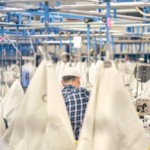Britain’s top companies are accelerating cost-cutting measures amid growing fears over the global economic outlook, worsened by President Trump’s unpredictable trade policies. Even before the latest tariff twists from Washington sent markets into a spiral, a new Deloitte survey revealed rising anxiety among the UK’s largest firms.
The survey of chief financial officers (CFOs) from FTSE 350 companies, conducted in late March, found geopolitical risk concerns at their highest since Russia’s 2022 invasion of Ukraine. Worries over the stability of the US economy — still the world’s largest — also loomed large.
“Periods of trade uncertainty tend to result in a prolonged squeeze on investment,” said Amanda Tickel, head of tax and trade policy at Deloitte UK. “It is unsurprising that CFOs are reporting such elevated levels of uncertainty.”
Deloitte’s findings show that even in the absence of a formal US tariff announcement, UK companies had already begun slashing costs at a pace not seen outside the COVID-19 pandemic. The majority of CFOs are now prioritising defensive strategies, with 63% identifying cost-cutting as their top goal for the year — the highest level since early 2020. Reducing debt and strengthening cashflow were also cited as key objectives, reflecting a shift away from expansion and toward resilience.
While Trump’s 90-day pause on new tariffs offered a short-term reprieve to non-Chinese trade partners, market volatility and fears of further escalation have only heightened business unease.
Baroness Harriet Harman, speaking on Sky News’s Electoral Dysfunction podcast, criticised the UK government for downplaying the severity of the crisis. “They need to show some judgment — it’s not OK for the largest economy in the world to wreak havoc, not just domestically but across the global economy,” she said.
In response, the UK government has introduced measures aimed at easing pressure on businesses. These include a temporary suspension of import tariffs on 89 consumer and industrial goods — from pasta and juices to gardening tools — a move expected to save British firms £17 million annually. Chancellor Rachel Reeves also announced a £20 billion expansion of government-backed export finance, with £10 billion specifically allocated to companies most affected by trade disruption.
Yet, despite global trade worries, domestic challenges remain front of mind for many UK business leaders. A YouGov survey for Price Bailey found that 38% of respondents ranked inflation and interest rates as their top concern, followed by 34% who cited the overall tax burden. In contrast, only 24% named international trade as their primary worry.
Still, the uncertainty from Washington and beyond has left UK firms on high alert. With no clear resolution in sight, finance chiefs are tightening budgets, scaling back risk, and preparing for continued turbulence in a rapidly shifting global landscape.









